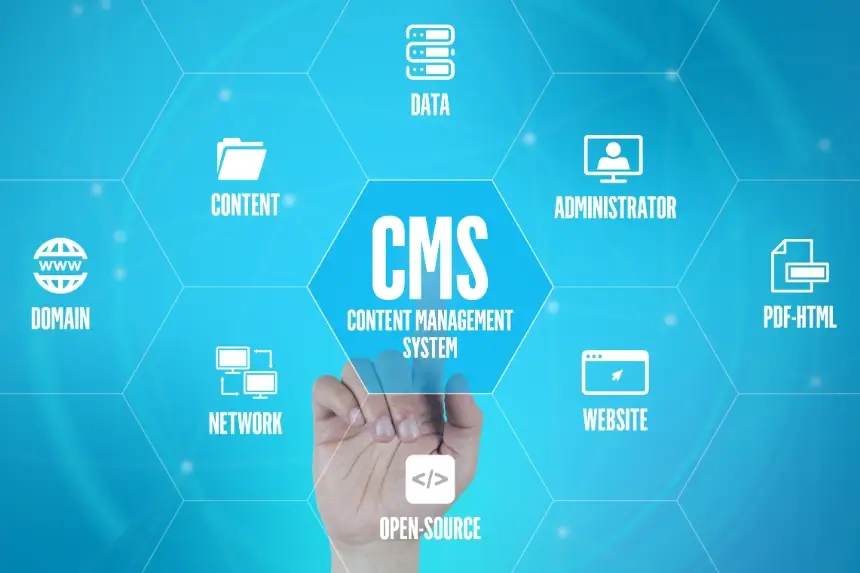Running a small business often means wearing many hats — sales, customer service, operations, and yes, managing your website. But when it comes to creating, editing, and updating content online, not every business owner has time (or coding skills) to spare. That’s where choosing the best content management system for small business makes all the difference.
The right CMS can help you launch a professional website, keep your content fresh, and even boost your SEO without needing a full-time IT team. But with so many platforms out there — from WordPress to Wix to Shopify — how do you know which one fits your business best?
What Is a Content Management System?
A content management system (CMS) is software that allows you to build, manage, and update a website without needing to write code from scratch. Instead of hiring a developer every time you want to change text or upload an image, a CMS gives you an easy dashboard where you can:
- Create and edit content with simple text editors.
- Upload images, videos, and files in just a few clicks.
- Organize pages and menus to shape your site’s structure.
- Customize design and features using themes, plugins, or extensions.
For small business owners, a CMS is especially valuable because it balances ease of use with professional results. You can launch a polished website, run an online store, or even publish a blog to boost SEO — all without technical expertise.
In short, a CMS puts you in control of your digital presence, freeing you to focus on growing your business instead of wrestling with code.
Why do you need a CMS?
For many small businesses, a website is the first impression customers get. Without a content management system (CMS), keeping that site updated can be slow, costly, and frustrating. Here’s why having a CMS is a smart move:
1. Save Time and Money
Hiring a developer for every small update adds up quickly. With a CMS, you or your team can edit pages, add blog posts, or update product listings in minutes — no coding required.
2. Keep Content Fresh and Professional
Customers expect accurate information. A CMS makes it easy to keep your website current with the latest offers, events, or news, ensuring your brand looks polished and reliable.
3. Boost Visibility with SEO Tools
Most CMS platforms come with built-in SEO features (like meta tags, sitemaps, and mobile optimization). This helps your business rank higher in search engines, making it easier for new customers to find you.
4. Scale as You Grow
Whether you start with a simple website or expand into e-commerce, a CMS grows with you. You can add new features, pages, and integrations without rebuilding everything from scratch.
5. Improve Team Collaboration
If multiple people work on your site — for example, a marketer, a designer, and a content writer — a CMS allows them to collaborate smoothly with roles, permissions, and version control.
Bottom line: A CMS is not just a website tool. It’s a business growth tool — helping small businesses stay agile, visible, and competitive online.
Read:
Key Considerations in Choosing a CMS
Not every content management system will be the right fit for your business. The best CMS for small business depends on your goals, budget, and technical comfort level. Here are the key factors to weigh before making a decision:
1. Ease of Use
Your CMS should be intuitive. If you and your team need weeks of training just to publish a blog post, it’s not the right fit. Look for drag-and-drop editors and clean dashboards.
2. Cost and Value
Some CMS platforms are free but require hosting and add-ons, while others are subscription-based with bundled features. Consider both upfront and long-term costs, including themes, plugins, and potential developer support.
3. Design Flexibility
Can you customize your site to reflect your brand? Check whether the CMS offers themes, templates, or full design control to avoid a “cookie-cutter” look.
4. Features and Integrations
Think about what your business needs most: e-commerce tools, appointment booking, blogging, SEO plugins, or email marketing integration. A good CMS should connect seamlessly with your existing tools.
5. SEO Capabilities
Search engine visibility is critical for small businesses. Look for built-in SEO tools or plugins that help with metadata, mobile responsiveness, and fast page load speeds.
6. Scalability
Your CMS should grow with your business. Even if you start small, make sure it can handle more products, pages, or traffic without forcing a platform switch later.
7. Support and Community
When issues arise, will you have help? Large CMS platforms often have active communities, tutorials, and reliable customer support — all invaluable for small teams.
Tip: Make a list of your must-haves and nice-to-haves, then match those to what each CMS offers. This prevents you from paying for features you’ll never use or choosing a system that limits your growth.
What is the best tool for content management?
The truth is, there isn’t a single “best” CMS for every small business. The right choice depends on whether you’re focused on blogging, e-commerce, or building a simple professional website. Below are the most popular and effective CMS platforms for small businesses, along with their strengths and drawbacks.
1. WordPress
- Best for: Flexibility and scalability.
- Pros:
- Open-source and highly customizable with thousands of plugins.
- Excellent SEO capabilities.
- Large community and support.
- Cons:
- Requires separate hosting and occasional technical know-how.
- Plugins need regular updates for security.
2. Wix
- Best for: Beginners who want simplicity.
- Pros:
- Drag-and-drop builder, very user-friendly.
- Hosting included.
- Plenty of templates for small businesses.
- Cons:
- Less flexible for scaling compared to WordPress.
- Limited customization beyond templates.
3. Squarespace
- Best for: Design-focused businesses (creative portfolios, service providers).
- Pros:
- Sleek, professional templates.
- All-in-one solution with hosting and support.
- Easy for non-technical users.
- Cons:
- Fewer integrations than competitors.
- Less customizable than WordPress.
4. Shopify
- Best for: Small businesses selling products online.
- Pros:
- Tailored for e-commerce with inventory, payments, and shipping tools.
- Supports multiple payment gateways.
- Scales easily as your store grows.
- Cons:
- Monthly fees can add up.
- Not ideal for content-heavy websites (blogs, portfolios).
5. Joomla! or Drupal (Advanced Options)
- Best for: Businesses with technical support teams.
- Pros:
- Very customizable and powerful.
- Good for complex websites with specific needs.
- Cons:
- Steeper learning curve.
- Smaller communities compared to WordPress.
Quick takeaway:
- If you want maximum flexibility, go with WordPress.
- If you want ease of use, Wix or Squarespace.
- If your focus is online sales, Shopify is hard to beat.
Which CMS platform is best for e-commerce?
When your small business revolves around selling products or services online, the best CMS for e-commerce needs to do more than just look good. It must handle inventory, payments, shipping, and customer experience smoothly. Here are the top options:
1. Shopify
- Why it’s best: Shopify is purpose-built for e-commerce, making it the most popular choice for small to mid-sized online stores.
- Strengths:
- Easy to set up and manage products.
- Secure checkout and multiple payment gateways.
- Built-in inventory and order management.
- Scales easily as your store grows.
- Limitations:
- Monthly fees can get expensive with add-ons.
- Limited design flexibility compared to WordPress.
2. WooCommerce (on WordPress)
- Why it’s great: Perfect if you already use WordPress or want full control over your online store.
- Strengths:
- Free core plugin with thousands of extensions.
- Highly customizable for design and functionality.
- Strong SEO and blogging features alongside your shop.
- Limitations:
- Requires more technical setup than Shopify.
- Hosting, security, and updates are your responsibility.
3. BigCommerce
- Why it’s solid: Designed for fast-growing businesses that need robust e-commerce features without relying on too many third-party plugins.
- Strengths:
- Built-in multi-channel selling (Amazon, eBay, social media).
- Advanced product and order management.
- Strong analytics and reporting.
- Limitations:
- More complex than Shopify for beginners.
- Pricing can feel steep for smaller stores.
4. Squarespace Commerce
- Why it works for small shops: Ideal for businesses that prioritize design but still need an integrated online store.
- Strengths:
- Beautiful templates with built-in shopping features.
- Hosting and support included.
- Simple to set up for small catalogs.
- Limitations:
- Limited advanced e-commerce tools (compared to Shopify or WooCommerce).
- Less flexible for scaling large stores.
Quick tip:
- Choose Shopify if you want a hassle-free, dedicated online store.
- Go with WooCommerce if you want control and customization.
- Pick Squarespace Commerce if you’re a creative business with a small product line.
Also read:
Best content management system for small business
The best content management system for small business depends on your goals — whether you want a simple brochure-style site, a blog to attract customers, or a full e-commerce store. Below are the top choices that balance ease of use, cost, and scalability:
1. WordPress (with or without WooCommerce)
- Best for: Small businesses that want flexibility and growth potential.
- Why choose it: It powers over 40% of the web, offers endless plugins, strong SEO tools, and full control over design. Add WooCommerce, and it becomes a powerful online store.
2. Wix
- Best for: Beginners who want a quick, no-code setup.
- Why choose it: Drag-and-drop design, affordable pricing, hosting included, and plenty of small-business templates. Ideal for service providers, freelancers, and local businesses.
3. Squarespace
- Best for: Creative businesses focused on design and branding.
- Why choose it: Sleek, modern templates with built-in blogging and e-commerce features. Perfect for portfolios, restaurants, or boutique stores.
4. Shopify
- Best for: Small businesses selling products online.
- Why choose it: An all-in-one e-commerce platform with secure payments, shipping tools, and easy inventory management.
5. BigCommerce
- Best for: Businesses ready to scale their online store.
- Why choose it: Built-in multi-channel selling, advanced reporting, and powerful product management without needing dozens of add-ons.
Quick recommendation:
- For general websites → WordPress or Wix.
- For creative or design-focused businesses → Squarespace.
- For e-commerce → Shopify or BigCommerce.
FAQ
1. What is the best content management system for small business?
The best CMS depends on your needs. WordPress is the most flexible and scalable, Wix is easiest for beginners, Squarespace is great for design-focused businesses, and Shopify is the top choice for e-commerce.
2. Is WordPress good for small businesses?
Yes. WordPress is free, highly customizable, and SEO-friendly. It’s especially powerful for small businesses that want long-term growth. However, it requires hosting and some technical management.
3. Which CMS is easiest for beginners?
Wix and Squarespace are the easiest for beginners. Both offer drag-and-drop builders, templates, and all-in-one hosting, so you don’t need coding skills to launch a professional site.
4. What CMS is best for e-commerce?
For small businesses selling online, Shopify is the best all-in-one solution, while WooCommerce (on WordPress) is great if you want more customization and control.
5. How much does a CMS cost for small business?
- WordPress: Free, but you’ll pay $5–$30/month for hosting, plus plugins and themes.
- Wix/Squarespace: Around $12–$40/month, all-in-one.
- Shopify: $29–$299/month, depending on your plan.
- BigCommerce: $29.95–$299.95/month.
6. Can I change my CMS later?
Yes, but migrating can be time-consuming. That’s why it’s smart to pick a CMS that aligns with your long-term goals from the start.
Conclusion
Choosing the best content management system for small business comes down to your priorities. If you want maximum flexibility and scalability, WordPress is a solid choice. For small teams that value simplicity, Wix or Squarespace make it easy to launch and manage a professional site. And if e-commerce is your focus, Shopify or BigCommerce deliver everything you need to sell online.
A CMS is not just about building a website — it’s about giving your business a digital foundation that grows with you. The right platform saves time, reduces costs, and helps you attract and convert more customers.
Next step: List your must-have features, set a budget, and test one or two platforms with a free trial. The sooner you choose the right CMS, the faster your small business can build a strong online presence.



